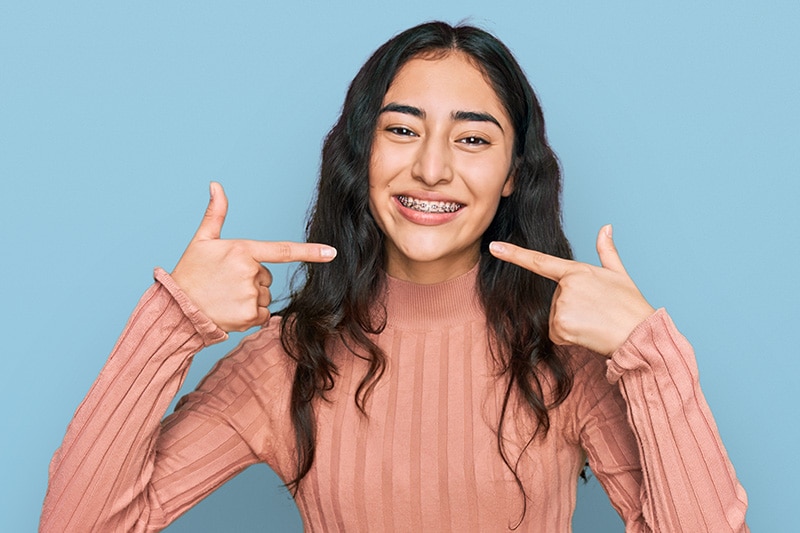Maintenance and Care for Braces
How Do You Brush and Floss with Braces?
Maintaining a clean and healthy smile is especially important when wearing braces. Braces can make brushing and flossing a bit more challenging, requiring you to adjust your routine. Consistent oral hygiene helps keep your teeth and gums healthy throughout your orthodontic journey.
Neglecting oral care may lead to plaque buildup, increasing the need for professional cleanings during treatment. Adults with a history of gum disease should also consider visiting a periodontist to ensure optimal gum health.
For guidance on proper care techniques, watch the two helpful videos below to learn how to clean your braces effectively.
What Can You Eat with Braces?
A common question from patients is, “What can I eat with braces?” Here’s the scoop:
After getting braces or following an adjustment, it’s best to stick to soft foods for a day or two. Avoid tough meats, crusty bread, or crunchy salads initially. Don’t worry—you’ll be able to enjoy your favorite snacks, like celery sticks, soon enough!
Throughout your treatment, it’s crucial to protect your braces by avoiding foods that could damage them.
Foods to Avoid:
- Chewy foods: Taffy, fruit leather, granola bars
- Crunchy foods: Potato chips, pretzels
- Sticky foods: Marshmallows, toffee
- Hard foods: Unpopped popcorn kernels, hard pretzels
- Foods you bite into: Whole pears, raw bell peppers
Additionally, chewing on non-food items like straws, ice cubes, or nails can harm your braces. Damaged braces may extend your treatment time and lead to extra visits.
What Should You Expect When You Feel General Soreness?
It’s normal to feel some general soreness in your mouth when your braces are first placed. You may notice tenderness when biting for 3–5 days. Over-the-counter pain relievers, like Tylenol, can help ease the discomfort.
During the first couple of weeks, your lips, cheeks, and tongue may also feel irritated as they adjust to the braces. To minimize irritation, use orthodontic wax, which we will provide, to cover any areas causing discomfort.
Why Do Your Teeth Feel Loose During Treatment?
Feeling your teeth loosen during treatment might seem concerning, but it’s completely normal! This is a vital part of the process. Teeth must loosen slightly so they can shift into their new, corrected positions. Once treatment is complete, your teeth will stabilize and feel secure again.
What Should You Do If a Wire or Band Comes Loose?
Occasionally, a wire or band may come loose—it happens! If a wire is causing irritation, gently push it back into place using the eraser end of a pencil. If this doesn’t resolve the issue, apply orthodontic wax or a small piece of wet cotton to protect your lips and gums.
Be sure to call our office as soon as possible so we can fix the issue and keep your treatment on track.
Why Is Rubber Band Wear Important for Treatment Success?
For successful orthodontic treatment, teamwork between you and your orthodontist is essential. Rubber bands or other prescribed appliances must be worn consistently to ensure your teeth and jaws move into their proper positions.
Following your orthodontist’s instructions diligently will prevent delays in your treatment plan and help you achieve your new smile on time!
How Can You Protect Your Braces During Sports and Athletics?
Do you play sports? Let us know! A protective mouthguard is essential for contact sports to safeguard your braces and teeth. We’ll provide a mouthguard designed to keep your smile safe while you stay active.
Wearing a properly fitted mouthguard reduces the risk of dental injuries, which can delay your treatment. Whether you’re on the field, court, or rink, protecting your smile should always be a priority. Remember, it’s better to take precautions than to face an unexpected emergency.
FAQ
How can I keep my braces clean while on the go?
Carry a travel kit with a small toothbrush, interdental picks, and orthodontic flossers. After meals, rinse your mouth with water and brush away trapped food. Bellevue patients often use compact water flossers for easy, portable cleaning.
Can I use an electric toothbrush if I have braces?
Absolutely. Electric toothbrushes do a great job cleaning around brackets and wires. Many Bellevue orthodontists recommend soft, round brush heads designed for braces to help prevent plaque and staining.
How do I keep my gums healthy while wearing braces?
Brush gently along the gumline, floss daily, and rinse with an antibacterial mouthwash. Regular checkups with Dr. Soper will help keep your gums healthy during treatment.
How can parents help kids keep braces clean?
Parents can help by setting reminders for brushing after meals, providing orthodontic flossers or water flossers, and limiting sticky snacks. Turning hygiene into a fun daily habit helps kids stay consistent.
What’s the best way to prevent stains or discoloration during braces treatment?
To avoid white spots or staining, limit sugary and colored drinks like soda, coffee, and tea. Brush thoroughly after meals and ask your Bellevue orthodontist about fluoride rinses to strengthen enamel and keep teeth bright.
